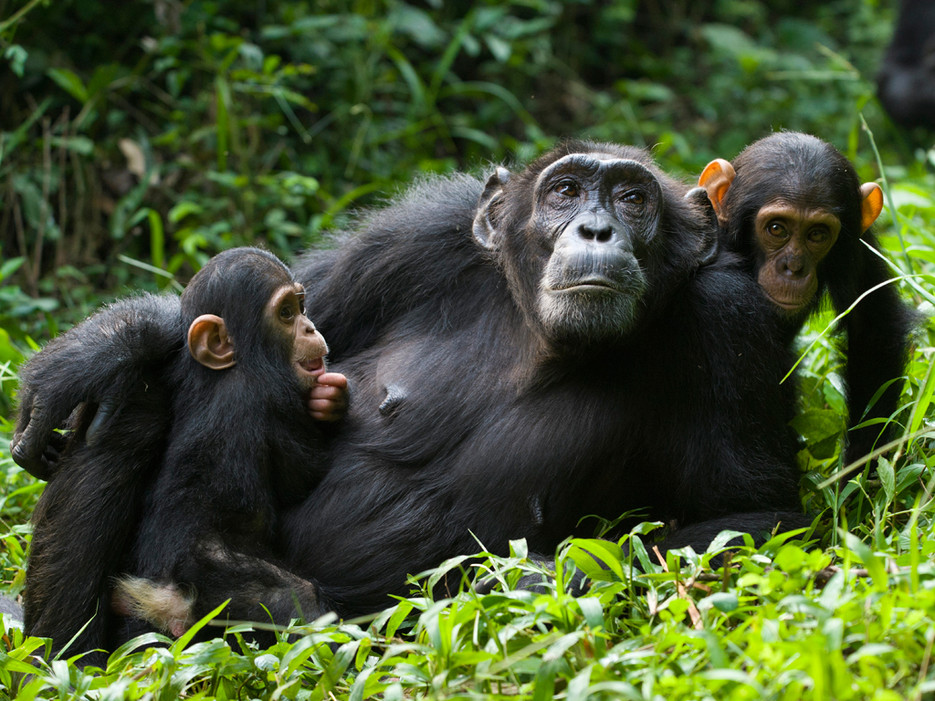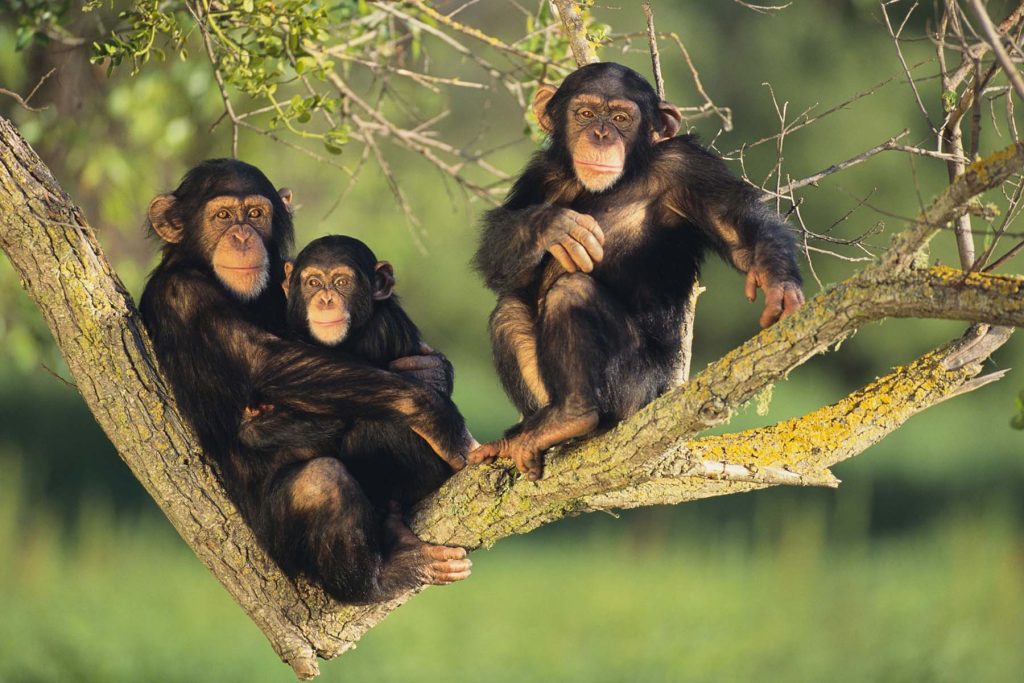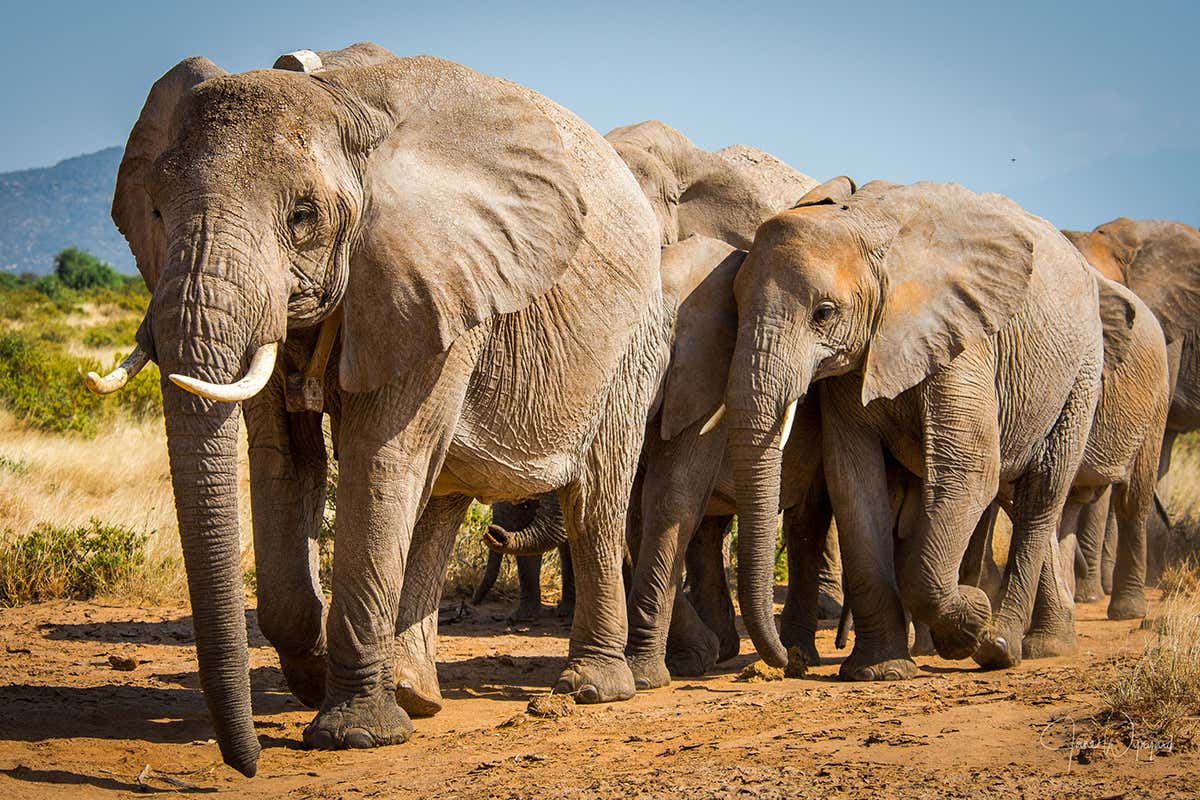Chimpanzees, also known as chimps, aren’t just fascinating – they’re intelligent and creative! Found across 21 African countries, these close relatives of ours call lush rainforests and woodlands home. Here in Uganda, you can embark on a chimpanzee adventure through Kibale National Park, Kalinzu Forest, Budongo Forest or Kyambura Gorge. Rwanda offers chimpanzee trekking in Nyungwe National Park, while Kenya has the Sweetwaters Chimpanzee Sanctuary. Tanzania boasts sightings in Mahale and Gombe National Parks.
Easily identified by their coarse black fur and bare faces, hands, and feet, chimps are built for climbing. Their long arms swing them through the trees, and although they can walk upright, they often knuckle-walk on all fours. Males are bigger than females, weighing in at 40-70kg (88-154 lbs) compared to 27-50kg (60-110 lbs). Standing 4-5.5ft tall, they’re about the height of a child compared to a 6ft man.
In the wild, chimps live roughly 45 years, with some reaching 58 in captivity. There are even rare cases of chimps living up to 80 years old! Their intelligence is truly remarkable, making them a delight for tourists to observe.

Now, let’s delve into 5 fun facts about these incredible apes:
Communication
Chimpanzees are masters of communication, using a rich mix of body language, facial expressions, and vocalizations to chat with each other. It’s a complex system that allows them to share everything from “follow me to that yummy fruit tree!” to “watch out, there’s a leopard nearby!”
- Chimps use gestures like pointing, reaching, and shaking displays to get their point across. Facial expressions like grins, frowns, and open-mouthed threats also play a big role.
- When chimps need to send a message over long distances, they use loud vocalizations like hoots, roars, and even drumming on trees to get attention.
- For quieter communication, chimps have a repertoire of softer calls, like grumbles and squeaks, perfect for close-range conversations.
- Just like humans, chimps can smile, laugh, and grin! These expressions are often used during play and social bonding.
Social Behavior
Chimpanzees are the ultimate social butterflies of the ape world! Unlike their more solitary cousins, gorillas and orangutans, chimps live in vibrant communities that can number anywhere from 20 to over 80 individuals. These communities are like extended families, constantly in flux as relationships change.
Think of a chimp community as having many smaller, more temporary friend groups. These groups are led by a dominant male, but with a fascinating twist: there are always way more females than males! This imbalance creates a complex social dynamic.
Chimpanzees are like political strategists, forming alliances and coalitions through grooming (their version of hanging out) and sometimes even sharing food or mating opportunities. They’re also surprisingly compassionate, comforting each other after fights and even showing signs of grief and sympathy. Just like us, they’re curious creatures, always eager to learn and explore their world.

Reproduction
While chimpanzees share some similarities with us, their love life is a bit more…complex. Unlike humans, chimps don’t mate for life. Females reach sexual maturity around 13 years old, and a telltale sign – a pink swelling on their rear – lets the males know they’re ready to reproduce.
Here’s where things get interesting: female chimps can choose multiple partners, not just one. This is thought to reduce the chances of infanticide by another male. After an 8-month pregnancy, which can happen year-round, a single baby chimp is born.
For the first two years, this little chimp is practically glued to mom, clinging on for dear life (and milk!). Weaning happens around 4 years old, and by then, the youngster is starting to become more independent. But don’t expect them to be ready to start their own families just yet – sexual maturity in chimps arrives much later, around 10 to 12 years old.
Habitat and feeding
Chimpanzees are true masters of their environment, at home both on the ground and high up in the trees. In fact, they spend their nights nestled comfortably in sturdy nests built high up in the branches, often using the strong Ugandan ironwood tree for a stable foundation.
Their ideal habitat? Look no further than lush tropical rainforests and savannah woodlands. While rainforests are a favorite hangout, chimps can also be found adapting to the more open savannah woodlands.
These clever creatures are omnivores, meaning their menu is a delightful mix of plants and animals. Fruits, shoots, bark, leaves, seeds, and flowers are all on the chimpy grocery list. They even enjoy the occasional mouthful of soil, honey, or a stolen bird’s egg. But chimps are surprisingly good hunters too, sometimes taking down small animals like monkeys and antelopes.
Dawn breaks and chimps awaken in their leafy beds. Breakfast time! They head out, searching for the day’s delicious offerings. While most of their meals are enjoyed high up in the trees, they’ll also forage for tasty treats on the ground. With their long arms perfectly suited for climbing, swinging between branches is a breeze for these acrobatic apes. After a satisfying lunch, it’s time for a well-deserved nap in the warm afternoon sun.
Use of tools
Chimpanzees are more than just intelligent; they’re resourceful! These brainy primates are known for their impressive tool use, especially when it comes to finding food.
Imagine a chimp cracking open a tough nut. They don’t just use their teeth – they might grab a rock or a piece of wood and use it as a hammer! Leaves are another multi-purpose tool, perfect for scooping up water or wiping their face after a yummy meal.
But the cleverness doesn’t stop there. Chimpanzees can transform a small branch or blade of grass into a termite-fishing tool, perfect for extracting these tasty insects from their hidden homes. And if danger lurks, they’re not afraid to throw a rock or a branch to scare off a potential threat. A curious chimp encountering a snake might use a stick to poke and prod at it from a safe distance – a smart way to investigate the unknown!
These are just a few of the many reasons why chimpanzees are such captivating creatures. A trip to see them in their natural African habitat is an unforgettable experience. Come visit Uganda and witness these intelligent and playful primates for yourself!






Актуальное медоборудование играет ключевую роль в обследовании и работе пациентов.
Больницы всё чаще используют инновационную системы.
Это даёт возможность докторам делать точные диагнозы.
Актуальные приборы гарантируют комфорт и для пациентов, и для персонала.
http://skatefluckit.com/showthread.php?t=328510&p=783579#post783579
Внедрение высоких технологий помогает результативное лечение.
Часто устройства имеют опции для глубокого наблюдения состояния здоровья.
Специалисты могут своевременно действовать, основываясь на данных аппаратуры.
Таким образом, новейшее медицинское оборудование улучшает качество медицины.
This resource provides a lot of engaging and valuable information.
On the website, you can learn about many topics that expand knowledge.
Visitors will value the resources shared through this platform.
Every category is organized clearly, making it comfortable to use.
The articles are relevant and engaging.
It’s possible to find tips on numerous themes.
Whether you’re looking for useful facts, this site has a lot to offer.
Overall, this site is a valuable hub for information seekers.
https://tango-city.de/
This resource offers a lot of captivating and helpful information.
Here, you can find various materials that help you learn new things.
Visitors will benefit from the content shared on this site.
Each section is easy to navigate, making it pleasant to use.
The articles are easy to understand.
You can find information on various fields.
No matter if you seek educational content, this site has everything you need.
Overall, this site is a reliable place for curious minds.
https://stolice.info/
Alright, so, 13win23com… it’s alright. Nothing super fancy, but gets the job done. Depositing was easy, and I’ve seen some friends have good luck. See if it suits for you: 13win23com
OK, ok, OK! ok365app is pretty slick. Everything is well-organized and responsive. Definitely downloading this app again. Get yours here: ok365app
mwcbet https://www.mwcbeth.com
MWCAH Online Casino Philippines: Easy MWCAH Login, Register, Slots & App Download Join MWCAH Online Casino Philippines for the ultimate gaming experience. Enjoy easy MWCAH login, fast MWCAH register, premium MWCAH slot games, and a seamless MWCAH app download. Start winning today! visit: MWCAH